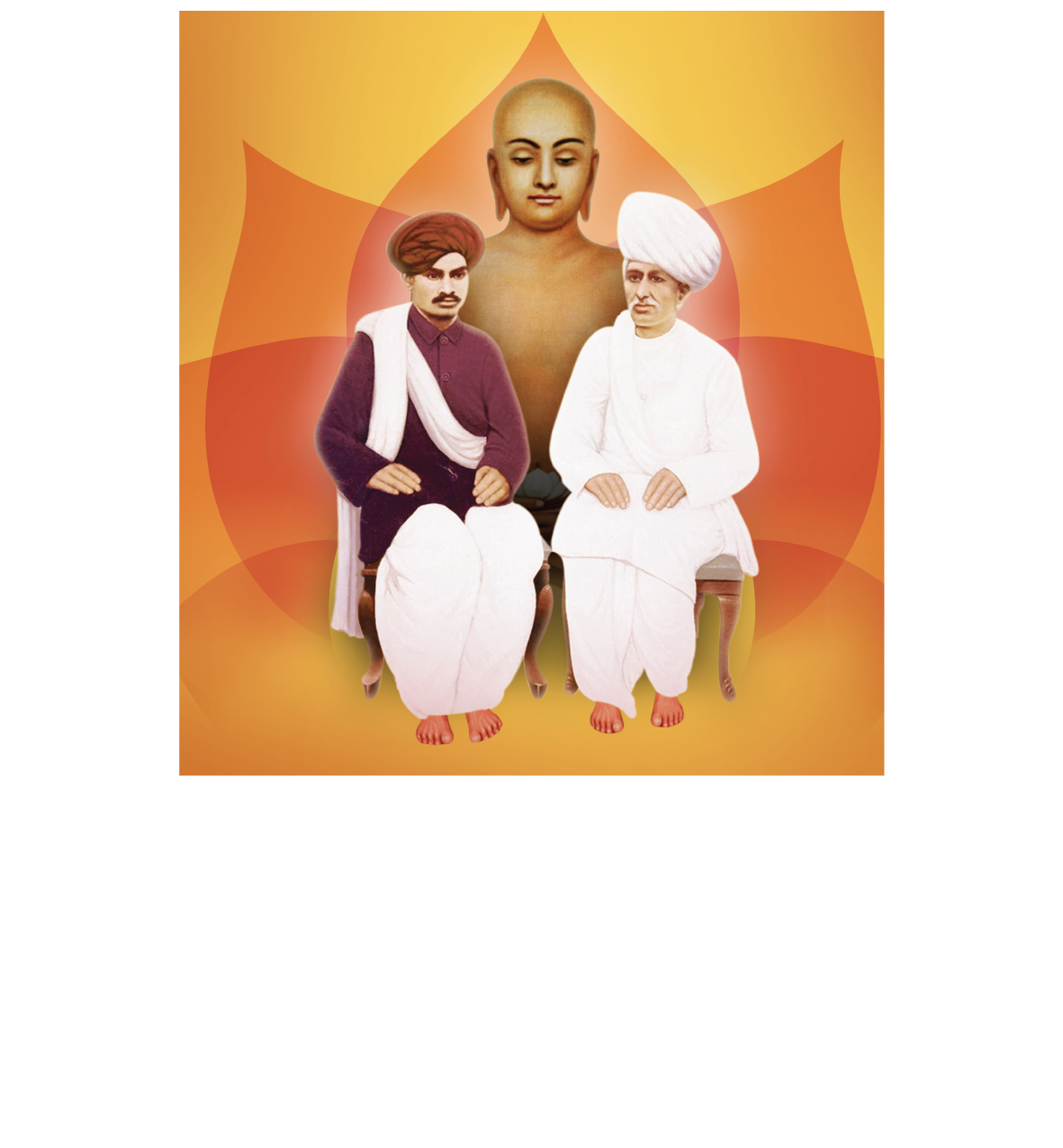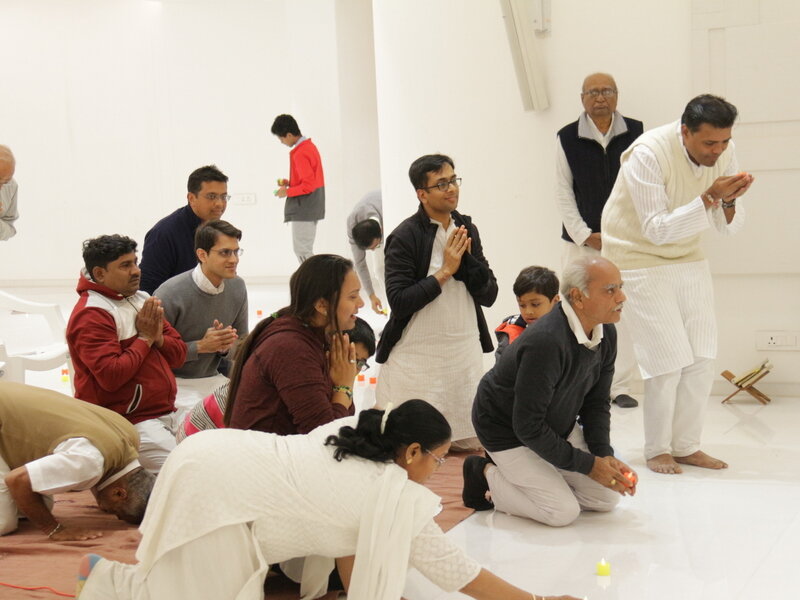Dec 25-31, 2019
Sayla
Every year for 27 years now, Brahmnishth Vikrambhai and Brahmnishth Minalben have been conducting yuva shibirs, introducing and guiding new seekers on the path to salvation. As per Param Pujya Bapuji’s agna, Vikrambhai chooses relevant and practical subjects every shibir while Minalben explains earmarked letters from Shrimad Rajchandra’s Vachnamrut.
This year was no different, the shibir (retreat) started in the divine basement of the Raj Mandir with the chanting of Navkar Mantra. Vikrambhai’s topic of choice for this shibir was “Five virtues paving the path to Samyak Darshan”. Through relevant stories and first-hand experiences Vikrambhai explained the five virtues.
What does Samyak Darshan mean?
Samyak stands for eternal truth and darshan means to experience, Samyak Darshan hence means realisation of the truth. In our worldly lives, change is the only constant truth, everything is momentary. Samyak Darshan emphasises on transcending to a truth that is eternal and does not change in minutes, months, years or even lifetimes.
What are the virtues that pave the path to Samyak Darshan?
1. Shraddha: Unconditional faith is the base of this path to self realisation. Belief in the holy trinity of Satdev, Satdharm and Sadguru is the quintessential tool we are armed with. It is this shraddha that eventually helps us imbibe other virtues. A couplet written by Saint Kabir perfectly sums up this thought,
“Dukh mein sumiran sab kare, sukh mein kare na koi,
Jo sukh mein sumiran kare, toh dukh kaahe ko hoi!”
Those that live with unshaken faith in the holy trinity will never be bothered by the adversities of life.
2. Upsham: Controlling our passion results in upsham or relief from the karma we have gathered over births. We need to master the feelings of anger, pride, deceit and greed. We should be able to recognise them when they rise and keep them from over powering our actions. Vairagya and upsham are two methods to cure our desires and passion. These four feelings are like a fire burning inside us, they may burn someone else but they damage us the most.
“Avichaare karine toh moh chhe, kar vichar toh paam!”
It is the lack of thought, about the true nature of what we desire, that leads us astray. Contemplate to realise.
3. Nirved: Nirved refers to the realisation of misery our soul has experienced one life after the other. The pain our soul has been subject to since the beginning of time is immeasurable. Living infinite lives, we have borne unimaginable agony. Every soul in every form in all the four loks is unhappy, except the enlightened, only they are truly happy.
4. Samveg: Samveg is the acute desire to attain Moksha. If a casino put up a board saying no winnings were allowed to be cashed, one must leave them all inside, would anyone enter? No. Our life is the same, everything we accumulate here, we must leave behind. Only our karma can be carried forward. Knowing this, only a fool would waste his time achieving worldly success instead of investing in his Aatma.
5. Anukampa: “Anya nu dukh dur kare, ene potana dukh nu vedan thatu nathi.”
If we are compassionate and can feel the pain of those around us, our problems will take a back seat and minimise. Helping and being of use to others, in reality, helps us.
On December 28, for the evening swadhyay, Param Pujya Bhaishree graced the yuva shibir with a story on the importance of satsang:
There once lived a young boy who worked as a porter. Though he was poor, he had a clean heart and enjoyed satsang. He had one precursor to his service: the journey must include spiritual discussions; should be a satsang. A man hurriedly came up to him to buy his services. The boy laid down his condition to which the man didn’t pay much attention and agreed since he was getting late. The boy began narrating a spiritual story and when they arrived at their destination, asked the man if he had enjoyed the story. The man simply said that he wasn’t paying attention and that he just needed his bags delivered. The young boy, with his knowledge, realised that the man was going to die the next evening. When he tells the man this, the man asks for a solution. The young boy gives him a trick. The next evening, as predicted, the man dies of a heart attack. On reaching Yampuri, Chitragupt asked the man if he wanted the punishment for his wrongdoings first or the reward for his good deeds. As instructed by the boy, the man said that he did not wish for the reward of his good deeds but only wanted to see it. Chitragupt was left confused since no one had ever made such a request before. He took the man to Indra who also found himself in such a situation for the first time. All three of them then proceeded to Lord Vishnu. Upon hearing the situation, Vishnu used his powers and saw the young boy had led the man to him. He said that the boy had indeed saved the man as he ended up meeting and talking to God himself. This is the power of satsang, it is the only way to meet God.
Minalben started off the shibir teaching mumukshus how to identify true sources of happiness. Only when the happiness attained is permanent, doesn’t lead to sadness and never diminishes can we say that something makes us happy. If the happiness is followed by sadness, comes with fear or isn’t going to keep increasing, the source isn’t a true reason to be happy.
She then went on to explain letters 600 and 603 from the Vachnamrut. Letter 600 conveyed to readers:
- the respect Param Krupalu Dev had for Shri Saubhag bhai, he starts the letter clearing a misunderstanding from previous letters.
- the difficulties Shrimad faced while living his everyday life and trying to remain unattached through it.
- the importance of brahmacharya and
- how one must only preach religious ideologies only after attaining a higher level, revealing Krupalu Dev's humility.
In letter 603 we learn:
- the happiness we feel is a mirage and only the happiness of an Enlightened Soul is true happiness.
- how a Gnani gathers no new karma but simply washes away those he had collected in the past through glad acceptance and samta (equanimity).
- a Gnani’s detachment from worldly activities even though he partakes, sambhaav keeps him disengaged and
- the absence of greed in a Gnani’s life
Testimonials:
"Param Pujya Vikrambhai and Param Pujya Minalben’s yuva shibir beautifully captures two feelings in me - the bliss of peacefulness in spirituality compared to the daily stresses of “sansaar”, and at the same time, the urgency of spiritual progress once you begin to appreciate the rare opportunity presented to you in the form of Gurudev Bhaishree and his gurugam gyan that is bestowed to me in the form of aagnas. And so, at the end of yuva shibir, I’m only left thinking ‘apurva avsar kyare aavshe’.” - Shrey Jasani, 25, Dubai
"This Yuva shibir was the first shibir I have attended and it was one of the most calming and enlightening experiences. Starting from Bhaishree's satsang to Vikram uncle's practical learnings to Minal aunty's short stories, it was spiritually enriching. My favourite saying from this Shibir would be "Don't do what the Guru does, but do what the Guru says.”” - Dhara Bakhai, 21, Dubai
“The peace you experience within during the shibir makes it very hard to leave. It allows you to return and start the new year with a motivated and happy mind. Experiencing firsthand the compassion of a Guru and his ability to only look at the good in every soul is something that touched me and drives me further on this path.” - Unnati Shah, 22, Mumbai














